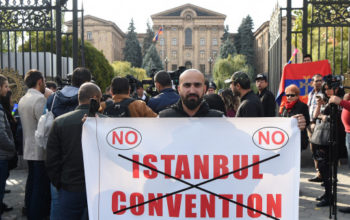Echo chambers: an old-school approach? Echo chambers. For many of us, this is a 21st-century issue were we are extremely connected with media and social networks and, in fact, this is not wrong! In our days, big technology companies are using and developing new ways to collect and analyze our personal information online and track it in order to create an extremely complete profile for each user. Having specific details about your researches, contacts, and personal information are all available online, companies are able to work efficiently in order to reach objectives related to the audience. Part of the practical consequences of this “tool” is the ability to control our results online and this can be a strong weapon to manipulate our thoughts. Filtering your researches online attending to your personal preferences or ideologies results in the removal of different opinions and alternative approaches from your feed. You are restricted to the content that you already agree with. It is pretty easy to imagine the advantages that this reality can offer for commercial purposes and the negative issues that it can bring for social development. Scary, right?
“Although millions of people are using the Internet to expand their horizons, many people are doing the opposite, creating a Daily Me that is specifically tailored to their own interests and prejudices” – Professor Cass Sunstein
We all agree that actual and future generations tend to be more and more present and focused in the online content and many investigators defend that, in extreme ways, the action of the online echo chambers/ filter bubbles can slow down the social development and the critical thinking… that’s why we should take it seriously. Let’s pay attention to the echo chamber concept:
“Echo chamber” is a term that is widely used in today’s lexicon, that describes a situation where certain ideas, beliefs or data points are reinforced through repetition of a closed system that does not allow for the free movement of alternative or competing ideas or concepts. In an echo chamber, there is the implication that certain ideas or outcomes win out because of an inherent unfairness in how input is being gathered.”
So, it’s easy to understand that when we are exposed to the online effect of the echo chamber and filter bubbles our mind remains free, but our eyes can turn blind to external and different realities. This is one of the biggest pillars of the theory that defends that the echo chamber crisis is not a 21st-century issue. The Humanity history is full of examples of how human minds tried to impose their own opinions by shutting up alternative ideologies. We must agree that it can be an extreme comparison because (for example) during the fascism period in Europe, people were forced to believe and accept ideas and now we are free to have a critical mind and take options. Unfortunately, the results in minds can be very similar attending how social media is working nowadays. Something that is very common between the dictatorial regimes is the dominance of an ideology and the consequent repression of different ones. This repression can be violent sometimes and aims to avoid attacks against the person or group of people that are in power or create disorder between the citizens that are under the power. For the supporters of this theory, this is a clear echo chamber system without algorithms or online tools. Using censorship where dictatorial leaders can delete alternative concepts from the public attention and resume everything to the ideology that is ruling.
Let us think about the “Blue pencil” that censured Portuguese press and culture during Salazar’s years, the huge Fascist Italian propaganda machine, the political prisons of the Soviet regime, the Nazi political police and torture system. All the mechanisms were vital to repress or spread messages according to the power ideology of the time limiting civilians to that one. The supporters of this theory don’t say that the process is the same, they just believe that the basic thought and the results are very close and we should pay attention to it in order to avoid big mistakes of the past. Unfortunately, we don’t need to rewind that longer in order to find other examples of similar echo chamber effect. It’s time to talk about the press during the “offline period”.
The 90 were the scenario for big media covers. Back in those days, the new technologies appeared and the news coverage started to be more attractive and efficient in a global term. Big scandals, deaths, and events were under media attention. Bill Clinton’s affair with Monica Lewinsky, the custody release of Mandela, the Gulf war, Princess Diana’s death and all the technological advancements of that time were victims of the hunger of the media. David Shaw, a Pulitzer Prize winner, is a critique of the press attitude during those times and from there forward.
“None of these charges was ultimately proved, but the media largely acted in a pack, as it so often does on big events, and reporters’ stories, in print and on the air, fed on one another, creating an echo chamber of horrors” – David Shaw about the 1990 “McMartin preschool trial”
For him, during the coverage of big news, the press tends to act as a group because the viewer is focused and no one wants to lose their attention. That’s why all the communication services act together sharing information between them. Shaw thinks that values as justice and skepticism tend to be ignored during the hysteria. That’s when sensationalism begins… when the values are overtaken by the race to be the first service giving the breaking news. This phenomenon can be dangerous because media has a huge power to manipulate public opinion through the non-verification of information and sharing of details in a controversial way. In this article, I brought you two perspectives about echo chambers, for sure, both based in past times. Two different ways to act, but both filtering the information that the citizens receive to enable them to contact and experience the beauty of diversity. Through violence/censorship, the absence of critical filtering of information or filter bubbles, echo chambers are real!
Do you still believe that the echo chambers are a modern issue?
Ricardo Leitão



